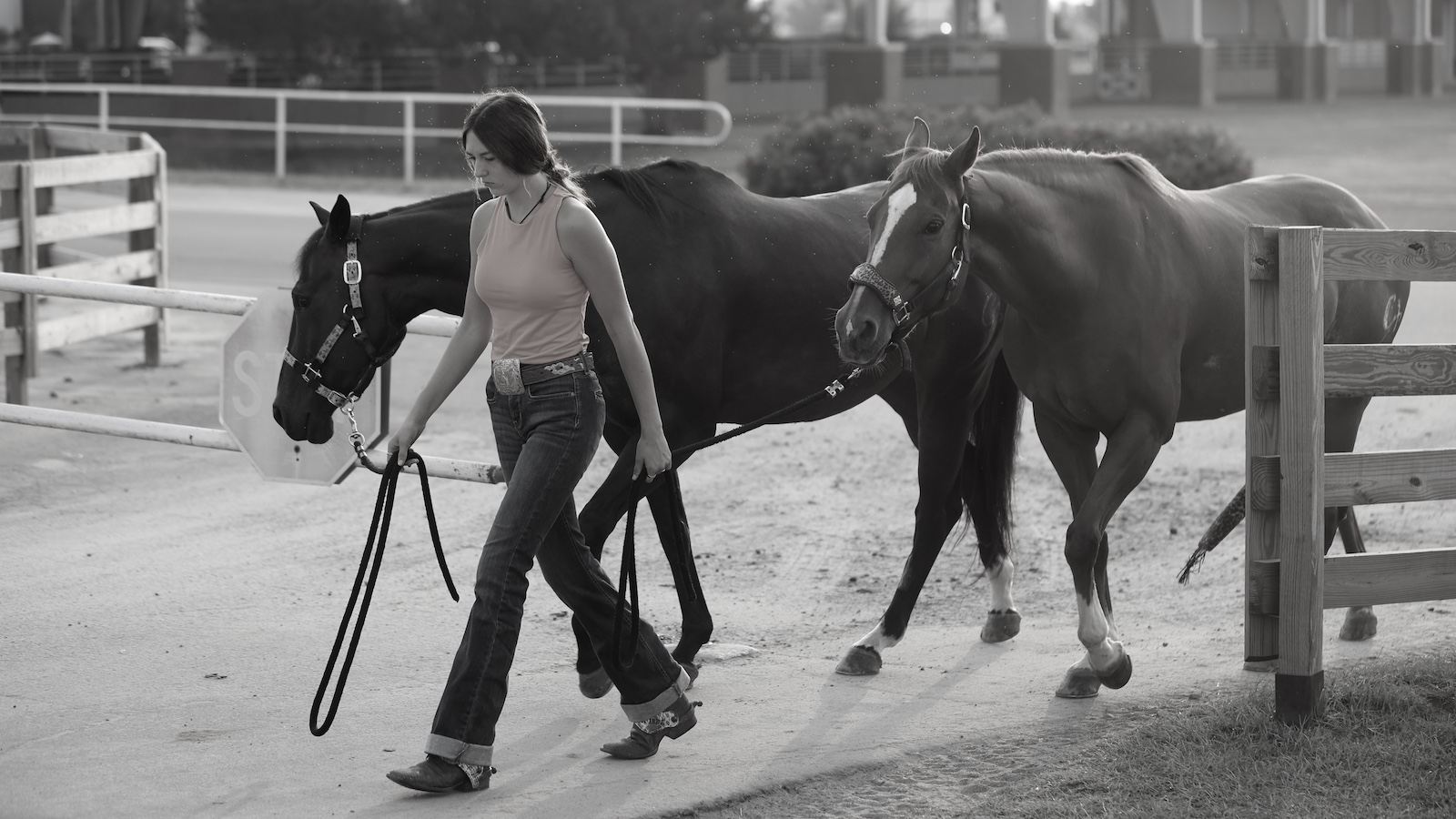Horse training is synonymous with a lot of terms, but the first one that jumps to my mind is “work.”
Horse training is not bad work, and it’s not miserable work. But there is no substitution for the hours logged and the list that needs to be done every day. We all need help. And there are trainers everywhere, all the time, that are looking for that very thing. I’ve hired people to work for us, and I’ve worked for others. Working for a trainer can provide a very realistic insight into a world that sounds like a dream come true, and it’s a key experience for anyone who might want to become a trainer themselves. It’s also a good way to learn, experience and grow more of an opinion and skillset (while getting paid).
You don’t have to know a whole lot about horses to take a job working for a trainer. Sometimes, it’s almost preferable to have someone that’s a bit of a blank slate. Most horse trainers are particular. I equate them to artists. They have certain visions, habits and methods that they stick to, because it’s what they know, what they’ve learned, or what they’ve found works well for their scenario. It’s nice to have someone that’s malleable enough to train and learn to do things in that particular style.
What you do need to bring are two skills you have complete control over: your attitude and your effort. There are a lot of tasks that don’t require being in the saddle. They are thankless, unappealing and physically taxing at times. A trainer’s job is already filled with variables and stressors that the world doesn’t see or know about, so if you bring your best attitude and effort with you every day, it will be noticed, appreciated and encouraged.
Please know that I write this with the mindset of working for a trainer that is a good hand and a good person. Horse trainers are going to ask others about you before they commit to bringing you on. You should do the same. Not everyone’s style fits every horseman. Some trainers travel a lot, showing and hauling, constantly away from home. Some don’t compete at all. Some are incredibly kind and talented, and some are just bad people. And no matter what sort of guidelines you try to follow to set yourself up for success, you won’t be appreciated or credited because certain people are just no good to work for. But on the other side, realize that every time someone is unhappy or frustrated with you, it’s not abuse either.
Employers expect you to mess up. It happens. Own it. We all have a story and a path that has taken us to where we are. We mess up too. It’s part of it. If you could do what we can do, and you know what we know, you would be sitting in our saddle and not yours. Learn from the mistakes. Take credit for them. Make it right. Move on.
Can I be honest? We miss a lot. Unless we’ve got a team of people taking over every corner of our barn, our pens, our yard and our personal life, there are things all over our business that can be improved. Keep your eyes up and off your phone. Be flexible with your time and mindset. The extra effort to make things better is rarely time wasted.
Have some feel. This goes for horses, people, equipment and situations. I would advise against taking it into your own hands to train on everything you catch, saddle and ride (unless that’s been made clear in your list of duties!). Realize that there are a lot of things that go into training horses that go unseen. Have some feel for when your boss is having a quiet conversation with someone or disappears down the road for a half hour. It’s not your business. Their equipment might not be top-of-the-line, but treat it as though you bought it with your own money. Also, use discretion and don’t go blabbing about whatever you have seen, heard and experienced that may make for interesting conversation, juicy gossip or potential leverage with your buddies. You are part of a team. Be proud of that and be a little protective of it too.
Find someone that is willing to help you and whose methods fit your goals as a horseman. Don’t expect to be propped up or coddled. Not everything you do will be noticed. Your actions will speak for themselves. You can tell someone about how much you’ve roped and doctored cattle, but as soon as you pick up that string and start swinging, we can usually see it for ourselves.
Did you train a horse that went on to make the open Futurity finals? Did you work for a vet and are a whiz at bandaging legs? Anyone worth their salt will see what sort of skills you bring to the table (or where you might be green) with a little time. You don’t have to voice every accomplishment or retort back with every task about how well you do it. Just do it. Your capabilities are clear, and the right types of people will appreciate them.
A trainer’s time and talent is the biggest gift a person can receive who wants to learn. You aren’t paying for tuition — you are getting paid to be there. So, choose your work wisely, keep your eyes up, your ears open, your skills sharp and your intentions in the right direction. Don’t let them cut you down, make you feel small or crush what you want to do. The fact that you are even stepping outside of your comfort zone is something to be proud of. The right boss will be an asset in your horsemanship journey.
And should you thrive and achieve the success you craved in our horse industry, your responsibility and payback to those who were good to you narrow down to one thing: Please try to be the same for the kids who want to work for you someday.




